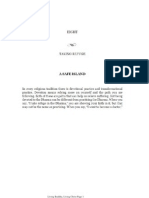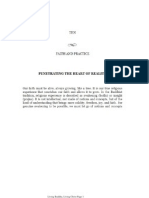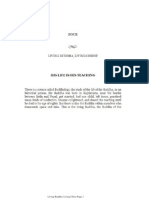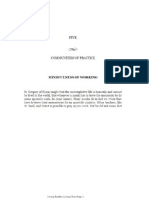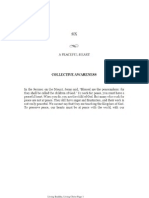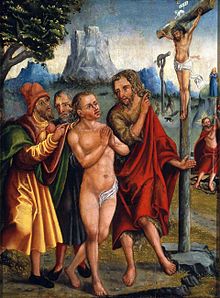가시를 거두세요 - 소나무 스님의 슝늉처럼 '속 편한' 이야기
광우 (지은이)쌤앤파커스2021-04-15
==
기본정보
312쪽
책소개
"귀에 쏙쏙 들어오는 재미있는 강의" "요즘같이 힘든 시기에 자꾸자꾸 듣고 싶어지는 말씀" "불안했던 마음이 편안해졌어요" "반복해서 들으며 마음을 다집니다"…. BTN 불교TV 최고 인기 프로그램인 [광우 스님의 소나무] 유튜브 영상에 달린 댓글들이다.
시청율 1위, 인기 검색어 1위를 놓치지 않는 '소나무 스님'의 명강의는 회를 거듭할수록 뜨거운 반향을 불러일으키며, 불교에 대해 관심 없던 사람들조차 열광하게 만들고 있다. 그런 광우 스님이 종교를 초월해 고민 많은 사람들을 위해 쓴 에세이 <가시를 거두세요>가 출간되었다.
이 책은 마음속에 뾰족뾰족 돋아난 가시로 나와 남을 찌르고 힘겨워하는 이들에게 들려주는 마음돌봄 이야기다. 살면서 맞닥뜨리게 되는 현실의 고민과 아픔, 갖가지 문제들을 지혜롭게 풀어나가는 명쾌한 해법을 담고 있다.
'투명 고릴라 실험' '변화맹 실험' 등 과학자들의 흥미로운 실험과 불교 설화, 자신의 수행담, 그리고 우리 주변의 이야기를 통해 인생을 바라보는 관점 자체를 돌아보게 한다. 내 삶의 문제와 잇닿아 있는 현실적인 사례들로 접근하니 더욱 공감이 간다. 각 장의 마지막엔 누구나 쉽게 따라 할 수 있는 상황별 생활명상법을 수록해, 작은 실천으로도 평온함과 고요함에 이르게 되는 놀라운 체험을 선사한다.
=====
목차
책을 내며
여는 글 | 무엇을 바꿀까?
1장 그냥 할 뿐입니다
왜 사는가
인생을 살아가는 모든 문제의 답
운명을 바꾸는 세 가지 법칙
원래 멀쩡해
같은 곳에
“난 그래도 삼재를 믿어”
깨어 있으라
가장이란 이름의 짐꾼이여
당신은 이미 기적입니다
내 안의 보석
세 가지를 꼭 기억해다오
번뇌를 없애는 최고의 방법
마음공부 첫걸음 | 호흡과 하나 되기
2장 중심만 잡으면 괜찮아요
무엇이 진정한 승리인가요
살아가면서 놓치는 많은 것들
아버지의 마지막 당부
조금은 흔들려도 괜찮아
엄마를 일으켜 세운 한마디
아이에게 배웁니다
뱃사공이 들려준 지혜
괴로움 없이 행복하게 사는 법
행복과 불행은 누구의 선택인가요
신이 만든 최고의 보석
마음을 다스리는 기술
호흡 명상 | 생각의 파도 다스리기
3장 가시를 거두세요
못된 사람을 상대하는 법
가시를 거두세요
히말라야의 바보 수행자
그래도 사람이 희망입니다
최고의 대화법
관상은 과학이다?
나는 로맨스 너는 불륜
당신을 용서합니다
말은 공허합니다
말에 휩쓸리지 않으려면
분노는 자신을 태웁니다
자비 명상 | 미움과 분노가 솟구칠 때
4장 혼자일수록 강해집니다
외로움이 보내는 신호
연꽃이 되다
벗어나 자유롭기를
번뇌를 이기는 두 가지 무기
운명을 바꾼 소년
인생의 기적을 만든 세 가지 숙제
노스님의 해몽법
나를 바꾸고 싶다면
무엇에도 기대지 않는 행복
되는 대로 있는 그대로
팔굽혀펴기와 명상
명상을 잘하고 싶다면
긍정 명상 | 걱정과 불안이 밀려올 때
5장 우리는 실수하는 존재입니다
사회생활의 세 가지 지혜
“이제야 자네가 수행 좀 하겠구먼”
세상에는 버릴 게 없습니다
오염된 마음과 순수한 마음
다른 사람을 대하는 모습
어느 무사의 마지막 말
진짜 부자 되기
부서질 때 크게 깨어난다
타인의 시선
인간은 착각 덩어리
정화 명상 | 상처받은 기억이 떠오를 때
6장 감정도 습관이랍니다
누가 이길까
어떤 눈으로 바라보나요
사라짐에 관한 단상
지금 이 순간의 일
진짜 행복을 찾고 있다면
깨어 있게 하는 삶의 기술
무너지지 않게 하는 힘
마음은 청개구리
상상은 힘이 세다
최고의 운전사
웃으니까 행복해요
미소 명상 | 희망과 긍정의 힘이 필요할 때
접기
책속에서
P. 27~28
삶은 끊임없는 문제의 연속입니다. 인생은 결코 내 뜻대로 살아가지지 않습니다. 삶의 문제들을 숙제 삼아 하나하나 풀어나가는 것이 바로 인생입니다. 온몸을 던져서 인생을 사십시오. 누구에게도 쉬운 인생은 없습니다. 그렇게 보이는 사람이 있을 뿐입니다.
― 「인생을 살아가는 모든 문제의 답」 중에서
P. 32
자신의 운명을 탓하며 마음 밖으로 이리저리 방황하기보다 차라리 자신의 운명을 밝고 환하게 바꾸길 권해봅니다. 다들 알고 계시죠? 운명運命의 ‘운’ 자가 ‘움직일 운’이라는 것을.
― 「운명을 바꾸는 세 가지 법칙」 중에서
P. 74~75
무언가에 유독 집착하는 사람은 살면서 오히려 더 많은 것을 놓칩니다. 일에만 집착할 때 건강을 놓쳐버릴 수 있고, 돈에만 집착할 때 관계를 놓쳐버릴 수 있고, 이익에만 집착할 때 사람다움을 놓쳐버리게 됩니다.
― 「살아가면서 놓치는 많은 것들」 중에서
P. 96
“돌 위에 꽃을 피우겠다는 생각이 바로 어리석음입니다. 돌 위에 꽃이 필 수 없듯이, 아무 괴로움 없이 평생 행복하게만 살 수는 없습니다. 어떤 괴로움도 없이 평생 행복하게만 살겠다는 생각이 어리석음이란 것을 깨닫는다면 그대의 삶은 훨씬 편안해질 것입니다. 명심하세요. 살다 보면 괴로움도 생기고 행복한 일도 생깁니다. 하지만 괴로... 더보기
P. 119~120
어느 정신과 의사가 말했답니다.
“정말 치료받아야 할 환자는 병원에 오지 않고 그런 사람 때문에 상처받은 사람들이 병원에 온다.”
여러분, 싫은 사람이 있다면 그냥 싫다고 말하세요. 미운 사람이 있다면 그냥 만나지 마세요. 별난 사람이 있다면 그냥 적당히 대하세요. 그런데도 도저히 비껴갈 수 없다면 이렇게 생각해보세... 더보기
P. 149
누군가 당신을 힘들게 했다면 그에게 말하세요.
“나의 행복과 마음의 평온을 위해서 당신을 용서합니다. 진심으로 당신을 용서하고 미움을 놓아버리겠습니다. 난 이제 자유로워지겠습니다.”
― 「당신을 용서합니다」 중에서
P. 171
외로울 때 외로움을 피하지 마세요. 외로움과 친해지세요. 외로움을 부정적인 감정으로 여기지 마세요. 항상 밖으로 치달리는 나에게 외로움이 신호를 보내옵니다. 이렇게 말을 건넵니다.
“너 자신에게 오롯이 집중할 시간이야.”
― 「외로움이 보내는 신호」 중에서
P. 183~184
번뇌가 제일 싫어하는 것은 ‘알아차림’입니다. 당신의 번뇌는 항상 당신을 속이고 있습니다. 너무 교묘해서 알아차리기가 힘듭니다. 그때 필요한 힘이 알아차림입니다. 당신의 마음을 살펴보세요. 좋은 생각도 알아차리고, 나쁜 생각도 알아차리세요. 생각의 흐름을 있는 그대로 알아차릴 때, 우리의 의식은 점점 깨어납니다. 그리고 번뇌는 비... 더보기
P. 202~203
참된 행복에는 조건이 없습니다. 왜냐고요? 조건과 원인으로 일어난 행복은 그 조건과 원인이 사라질 때 같이 사라져버리니까요. 돈으로 얻은 행복은 돈이 없으면 사라지고, 명예·권력·인기로 얻은 행복은 그것들이 무너지면 함께 사라집니다. 사랑 때문에 행복했는데 그 사랑 때문에 가슴 아프고 힘들어요. 원인과 조건에 기댄 행복은 결코 참... 더보기
P. 259
뇌는 늘 속고 있습니다. 인간의 가장 정교한 정보 처리 기관인 뇌가 이토록 허술하다는 사실에 한숨이 나옵니다. 그리고 스스로 되묻게 됩니다.
“지금까지 얼마나 많은 착각 속에서 살아왔던가?”
불완전하고 허술하고 빈틈 많은 뇌에 속지 않으려면 어떻게 해야 할까요? 답은 ‘성찰’입니다. 끊임없이 자신에게 질문을 던져야... 더보기
===
저자 및 역자소개
광우 (지은이)
저자파일
책과 명상을 좋아하는 수행자. 방송과 유튜브, 강연 등을 통해 고민 많은 사람들과 만나며 종교를 초월해 행복의 메시지를 전하는 ‘소나무’ 스님. 마치 옛날이야기같이 재미있고 감동적인 설법, 귀에 쏙쏙 들어오는 강의로 사람들의 가슴에 큰 울림을 주고 있다.
학창 시절에는 삶과 죽음, 진리에 대해 고민하며 철학자를 꿈꿨다. 손에 잡히는 대로 탐독하던 책들 속에서 마음을 밝히는 지혜의 말씀들을 접하고, 문득 ‘깨달음’을 얻고 싶어 열아홉 나이에 합천 해인사로 출가했다. 좌충우돌 설익은 절집 생활 속에서 좋은 스승과 좋은 도반들을 만나 귀중한 가르침을 받았다. 몇 년 동안 선원을 다니며 참선 수행에 집중했는데, 그토록 찾던 깨달음은 보지 못했지만, 그래도 마음속에 항상 걸려 있던 답답증이 사라지고 가슴이 시원해지는 체험을 했다.
여러 사찰의 불교대학에서 강의하다 우연히 부탁받은 것을 인연으로 BTN에서 설법을 시작하게 되었다. 이후 ‘광우 스님의 소나무(소중한 나, 무량한 행복)’를 5년째 진행하며 시청률 1위 프로그램으로 이끌었고, 유튜브를 통해서도 큰 사랑을 받고 있다. 닦을수록 늘 부족함을 느낀다는 스님은 여전히 안으로 사유하고 밖으로 관찰하면서 세상과 소통하는 수행자로 살고자 한다. 접기
====
출판사 제공 책소개
마음속에 뾰족뾰족 돋아난 가시로
나와 남을 찌르고 힘겨워하는 이들에게,
광우 스님이 들려주는 마음돌봄 이야기
“귀에 쏙쏙 들어오는 재미있는 강의” “요즘같이 힘든 시기에 자꾸자꾸 듣고 싶어지는 말씀” “불안했던 마음이 편안해졌어요” “반복해서 들으며 마음을 다집니다” “뭔가 뺏기기만 하는 것 같던 내 삶에 대한 불만이 다른 관점으로 소중해졌어요”….
BTN 불교TV 최고 인기 프로그램인 <광우 스님의 소나무> 유튜브 영상에 달린 댓글들이다. 시청율 1위, 인기 검색어 1위를 놓치지 않는 ‘소나무 스님’의 명강의는 회를 거듭할수록 뜨거운 반향을 불러일으키며 많은 이들의 가슴에 깊은 울림을 주고 있다. 심지어 불교에 대해 전혀 관심 없던 사람들조차 종교를 초월해 스님의 강의를 경청하며 하루하루 변화를 경험하고 있다는 후기도 올라온다.
종교의 벽을 넘어 스님의 강의가 많은 이들의 마음에 다가가는 데는 특별한 이유가 있다. 첫째, 마치 옛날이야기를 들려주듯 재미와 감동을 동시에 안겨주는 스토리텔링 강의 방식을 꼽을 수 있다. 둘째, 잠깐의 힐링이 아니라 삶의 문제들을 스스로 풀어갈 수 있는 해법을 구체적으로 제시하기 때문이다. 이번에 출간된 《가시를 거두세요》는 그러한 스님의 강점이 잘 드러난 책으로, 인생의 갖가지 문제를 지혜롭게 풀어나가는 명쾌한 해법을 들려준다.
뾰족한 가시가 나와 남을 찌르지 않도록
마음을 살피고 스스로 알아차리는 연습
《가시를 거두세요》는 마음속에 뾰족뾰족 돋아난 가시로 나와 남을 찌르고 힘겨워하는 이들에게 들려주는 마음돌봄 이야기다. 스님은 이 가시들의 뿌리가 바로 마음 깊은 곳에 고인 슬픔, 분노, 미움, 고통, 후회 등 수많은 상처와 감정들이라고 말한다. 그런데 더 깊이 들여다보면, 사실 그 가시는 “내 눈물이 굳어 뾰족해진 얼음송곳”이다. 마음속에 꾹꾹 눌러놓은 감정들이 뾰족한 가시가 되어 나와 남을 찌르고 삶을 힘겹게 만드는 것이다.
광우 스님은 귀로 듣고 귀로 나가는 ‘힐링’이 아니라 몸으로 체험하고 몸으로 닦아나가는 ‘수행’을 강조한다. 살면서 우리가 맞닥뜨리게 되는 현실의 고민과 아픔, 갖가지 문제들은 결코 힐링만으로 해결되지 않기 때문이다. 수행이라고 해서 어렵게 생각할 필요는 없다. 미처 돌보지 못한 감정의 찌꺼기들이 뾰족한 가시가 되어 나와 남을 찌르지 않도록 늘 마음을 살피고 스스로 알아차리는 연습이 바로 수행이니까.
이 책에서 스님은 ‘투명 고릴라 실험’ ‘변화맹 실험’ 등 과학자들의 흥미로운 실험과 불교 설화, 자신의 수행담, 그리고 우리 주변의 이야기를 통해 인생을 바라보는 관점 자체를 돌아보게 한다. 내 삶의 문제와 잇닿아 있는 현실적인 사례들로 접근하니 더욱 공감이 간다. ‘아, 이렇게 생각할 수도 있겠구나!’ 조금씩 깨달아가며 다르게 바라보기 시작하면 나를 힘들게 했던 문제들이 원래 큰 문제가 아니었음을 알게 된다. 각 장의 마지막에는 누구나 손쉽게 따라 할 수 있는 상황별 생활명상법을 수록했다. 스님이 차근차근 이끄는 대로 호흡하다 보면 작은 실천으로도 평온함과 고요함에 이르는 놀라운 체험을 할 수 있다.
“누구에게도 쉬운 인생은 없습니다.
그렇게 보이는 사람이 있을 뿐입니다.”
열아홉 나이에 해인사로 출가한 광우 스님은 어느덧 법랍 23년 차를 맞았다. ‘삶이란 무엇인가?’ ‘어떻게 살 것인가?’ ‘어떻게 행복에 이를 수 있을까?’ 가슴속에서 솟구치는 이 물음들에 대한 답을 구하기 위해 고등학교를 졸업하고 바로 출가했다. 좌충우돌 설익은 절집생활과 오랜 참선 수행, 고민 많은 사람들과의 소통, 그리고 깊은 사유와 관찰을 통해 스님이 찾아낸 답이 이 책에 오롯이 담겨 있다. 인생이란 끊임없는 문제의 연속이라는 것, 산다는 것은 우리 앞에 놓인 문제들을 하나하나 풀어가는 과정이라는 것, 누구도 이러한 인생의 숙제를 피할 수 없다는 것. 삶이 이토록 막막한 숙제로 다가올 때, 스님은 이런 조언을 들려준다.
우리는 살면서 끊임없이 고민과 문제에 부딪힙니다. 그러나 우리가 안고 있는 고민과 문제 가운데 상당수는 처음부터 별로 중요하지 않은 것일 수 있습니다. 인생을 바라보는 눈이 바뀔 때 나를 그토록 괴롭히던 고민과 문제가 원래부터 중요하지 않았다는 것을 실감하게 됩니다. _34쪽
‘남들은 별문제 없이 잘 사는데 왜 나만 이렇게 괴로운가’ 묻는 이들에게 스님은 답한다. 누구에게도 쉬운 인생은 없다고, 그렇게 보이는 사람이 있을 뿐이라고. 그러니 온몸을 던져서 꿋꿋이 인생을 살아야 한다고. 더불어 자신도 모르게 너무 힘을 주고 사느라, 또 남을 의식하고 남과 비교하며 사느라 지친 이들에게 따듯한 격려와 조언을 아끼지 않는다.
“마음을 다친 자,
마음을 딛고 일어나야 합니다.
당신의 마음은 무한합니다.”
세상 누구보다 사랑했던 사람이 원수가 되어 나를 괴롭히고, 눈에 넣어도 아프지 않던 자식이 가장 큰 아픔으로 나를 괴롭힐 때, 삶이 송두리째 부정당하는 듯한 괴로움을 맛본다. 그러나 스님은 사람으로 인해 마음을 다치더라도 사람을 통해 다시 일어서야 하며, 마음을 다친 자는 마음을 딛고 일어나야 한다고 말한다. 마음을 딛고 일어서는 법, 마음을 다스리는 기술은 어렵지 않다. 고요히 앉아 호흡하며 몸과 마음을 그저 바라보는 것. 잠시 마음을 바라보며 놓아버릴 수 있을 때, 우리는 진정 자유로워진다.
마음을 다스리는 최고의 기술로 스님은 명상을 권한다. 명상은 어렵지도 않으며, 신비한 무엇이 따로 있는 것도 아니며, 쉽고 단순한 하나의 기술일 뿐이라 말한다. 그리고 초심자를 위해 누구나 쉽게 따라 할 수 있는 생활명상법을 소개한다. 호흡하는 방법부터 시작해 잡념과 망상을 다스리는 수식관(호흡 명상), 미움과 분노를 가라앉히는 자비 명상, 걱정과 불안을 다스리는 긍정 명상, 상처받은 기억 등 부정적인 감정을 비워내는 정화 명상, 희망과 긍정의 에너지로 채우는 미소 명상의 방법들을 친절하게 안내한다. 매일 꾸준히, 짧게라도 자꾸 하다 보면 기분 좋은 감정도 습관으로 만들 수 있다.
북플 bookple
마니아 읽고 싶어요 (5) 읽고 있어요 (1) 읽었어요 (34)
평점 분포
9.8
====
구매자 (1)
전체 (3)
공감순
읽으면 마음이 편안해지는 책.
우리모두 내면의 가시를 거두고
행복해지기를. 구매
보리나무새 2021-05-03 공감 (1) 댓글 (0)
Thanks to
공감
마이리뷰
구매자 (0)
전체 (32)
리뷰쓰기
공감순
가시를 거두세요
수도원장은 미소를 거두고 말했습니다.
"그대가 침대를 바꿔다라고 했을 때 침대를 바꿔주었습니다.
그대가 음식을 바꿔달라고 했을 때 음식을 바꿔주었습니다.
그대가 방을 바꿔달라고 했을 때 방을 바꿔주었습니다."
수행자의 눈을 보며 수도원장이 말했습니다.
"자 이제는 당신이 바뀌어보세요." (-17-)
인생이란 무엇읾까요?
삶은 무엇이고 죽음은 무엇일까요?
누군가 이런 말을 했답니다.
"'앵' 하고 태어나 '휙'하고 살다가 '억'하고 살다가 '억'하고 죽더라."
왜 태어났는지 모르겠고.
살다보니 어느새 시간은 흐르고,
죽음은 예고없이 찾아옵니다. (-59-)
마음을 다스리는 기술은 어렵지 않습니다.
고요히 앉아 호홉하며 몸과 마음을 그저 바라보세요.
잠시 마음을 바라보며 놓아버릴 수 있을 때,
당신은 진정 자유로워질 것입니다.
당신의 마음은 무한합니다. (-110-)
세상 누구보다 사랑했던 사람이
원수가 되어 나를 괴롭힙니다.
눈에 넣어도 아프지 않던 자식이
가장 큰 아픔으로 나를 괴롭힙니다.
평생을 같이 잘 줄 알았던 친구가
작은 이익에 돌변합니다. (-129-)
차를 마실 때 차를 마시고
밥을 먹을 때 밥을 먹고
숨을 쉴때 숨을 쉴 뿐입니다.
온전히 존재할 뿐입니다. (-219-)
'나'를 움직이고 '나'를 조종하는 것이 마음입니다.
어떤 삶을 살지 선택하는 것도 '나'의 마음입니다.
어디선가 본 듯한 명언으로 마무리해봅니다.
"마음을 잘 다스리는 자야말로 최고의 운전사다." (-302-)
고슴도치는 가시로 자신의 연약한 몸을 보호하고, 장미는 가시로 자신의 아름다움을 보존한다. 사람은 내면 속 가시를 이용하여, 누군가의 공격적인 말과 행동에서 스스로를 보호하고, 지켜 나간다. 자연 속의 생명들이 보여주는 가시의 효용성과 다르게 인간의 내면의 마음 가시는 성격이나 기질로 바꿔 쓰게 된다. 집착이라는 인간의 나약함이 가시를 엉뚱한 상황이나 시점에 어떤 이들에게 내세울 때가 있다. 가시를 내세우지 말아야 할 때 ,내세우고, 들이대지 않아도 되는 때에 들이내는 어리석음이 인간 안에 감춰져 있었다. 그래서 불안하고, 당황스럽고, 매사 불편하다. 살아가면서 민폐가 되는 상황이 나타나고, 자신의 불행의 근원이 되고 말았다.자신이 평온하지 못하니, 다른 사람의 평온한 상태를 곱게 보지 않게 되는 악순환이 나타나고 있었다. 광우 스님이 쓴 <가시를 거두세요>는 수학을 못하는 이가 수학 공부를 하듯, 내 안의 마음에 문제가 생길 때, 마음 공부가 필요하다고 말하고 있었다. 내 안의 가시가 상황과 무관하게 나타나고 있는 건 내 안의 불평과 불만, 비교와 집착에 있었다. 스스로 과거의 기억을 내려놓고, 걱정과 근심을 내려놓는 것, 그 과정에서 자신만의 삶을 살아간다면, 내안의 긍정을 전면에 내세울 수 있으며, 내 삶을 따스하게 살아갈 수 있다. 현재에 충실하면, 누군가와 내 삶을 비교하지 않게 되고, 내 안의 감춰진 행복을 내 삶으로 바꿀 수 있다.타인을 바꾸려 하지 말고,내가 바뀌어야 한다. 타인의 보여지는 행복을 보면서 내 삶이 불행하다고 생각하는 습관을 내려놓고, 나답게 살아가면서, 나의 존재를 돋보이는 삶을 살아가면, 집착과 번뇌에서 스스로 벗어날 수 있으며, 가시를 거둘 수 있다.
- 접기
깐도리 2021-05-08 공감(4) 댓글(0)
===
가시를 거두세요
몸이나 겉에 난 가시는 없앨 수 있지만 마음에 난 가시는 없애기 어렵다. 마음의 가시를 없앨 수 있는 소나무 스님의 속 편한 이야기 <가시를 거두세요>를 읽어본다. 스님이 알려주는 이야기 중에 가장 인상에 남는 이야기가 있다. 매번 성형외과에 자신의 얼굴이 삐둘어지게 보인다는 상담을 하는 사람이 있었다. 성형외과 의사는 아무리 보아도 그 사람의 얼굴이 크게 삐뚤어진 것 같지 않았다. 그럼에도 자신이 얼굴이 자꾸 삐뚤어졌다고 성형외과를 오는 것이다. 그리고 성형외과 의사는 진지하게 그 사람과 이야기하고 다른 병원을 추천해 주자 다시는 성형외과에 오지 않았다고 한다. 그것을 궁금해 한 간호사가 의사에게 물어보자 의사는 그 사람이 시력에 문제가 있는 것 같아 안과에 보냈다고 한다. 자신의 얼굴이 삐뚤어졌다고 생각한 사람의 문제는 무엇이었을까? 진정한 문제는 얼굴도, 시력도 아닌 것 같다. 진짜 문제는 '마음의 눈'인 것이다. 마음의 눈을 교정하는 것은 마음공부라고도 할 수 있다. 우리는 매일 고민과 문제에 부딪힌다. 그러나 우리가 알고 있는 고민의 상당수는 처음부터 별로 중요하지 않은 것일 수도 있다는 것이다. 인생을 바라보는 눈이 달라지면 고민과 문제도 바뀌게 된다.
가끔 자신이 살고 있는, 처해 있는 환경을 탓하는 사람들이 있다. 그럴 때 연꽃이 되려고 결심한 소녀의 이야기를 들려주고 싶다. 사는 게 너무 괴로웠던 소녀는 괴로움을 피해 속세를 떠나 산으로 들어가 스승을 만나게 된다. 스승은 소녀가 괴로움을 피해 왔다고 하자 이곳도 괴로우면 피하겠냐고 한다. 소녀는 수도승이 되었지만 그곳 역시 자신이 생각했던 것과 너무 달라 또 괴로워 산을 내려갔다. 다시 속세도 괴롭기는 마찬가지였고 시간이 더 흘러 소녀는 여인이 되고 노인이 된 스승을 찾아간다. 스승은 여인을 연꽃이 핀 연못으로 데리고 가 연꽃의 이야기를 들려준다. 사람들은 연꽃이 아름다워 연꽃이 어떤 물에서 피는지 잊는다. 연꽃은 시궁창이 같은 바닥에 뿌리를 내리고 피는 꽃이다. 그때서야 여인은 자신이 주위 환경만 탓했던 것을 깨닫게 된다. 아름다운 연꽃을 보고 아무도 시궁창에 핀 꽃이라 하지 않기 때문에 여인은 자신도 연꽃처럼 꽃을 피우겠다고 다짐한다.
- 접기
리나 2021-04-28 공감(2) 댓글(0)
==
마음돌봄을 위한 책, <가시를 거두세요>
살다 보면 몸이 괴로운 순간보다 마음이 괴로운 순간을 더 많이 경험한다. 주변 환경으로 인해, 타인과의 관계에 의해, 개인의 욕심과 집착으로 인해... 매 순간 수많은 이유들로 우리는 마음의 괴로움을 경험한다.
괴로운 마음을 안고 침잠하다가 급기야 몸까지 아파지기 시작하면 머리끝까지 울분이 차오른다. 왜 나만 이렇게 괴로워야 하냐고, 왜 이렇게 괴롭기만 한 거냐고 큰 소리로 외치고 싶어진다. 누군가 툭 하고 건드리는 순간 빵 하고 터져버리는 풍선이 된 것 같다.
<가시를 거두세요>는 마음 때문에 힘겨워하는 사람들에게 건네는 따뜻한 위로와 희망을 담은 책이다. 평소 티비와 인터넷 방송, 강연 등을 통해 많은 이들에게 삶의 지혜와 희망의 메세지를 전달하는 광우 스님이 한 장 한 장 마음을 담아낸 책으로, 자신도 모르게 돋아난 마음속 가시로 인해 괴로워하는 사람들의 마음을 따뜻하게 달래준다.
이 책 속에는 스님이 들려주는 짧은 일화들로 채워져있다. 스님 자신의 경험담, 스님과 인연이 있었던 이들의 이야기, 스님이 듣거나 읽었던 옛일화, 흥미로운 과학 실험 등 재미있으면서 순간순간 마음에 훅 하고 와닿는 이야기들이 가득하다. 부담 없이 재미있게 읽으면서 그 순간에 와닿는 것들로 마음을 어루만지며 스스로를 돌아보고 돌볼 수 있다.
<가시를 거두세요>는 크게 6가지의 주제로 나누어 이야기를 들려준다. 1 장 '그냥 할 뿐입니다'에서는 운명을 대하는 태도와 인생을 살아가는 지혜에 대해, 2 장 '중심만 잡으면 괜찮아요'에서는 흔들리며 살아가는 삶에 대해, 3장 '가시를 거두세요'에서는 나 자신 역시 괴롭게 만드는 타인을 향한 미움과 가시에 대해 이야기한다.
이어 4장 '혼자일수록 강해집니다'에서는 스스로의 힘으로 바르게 서고 행복해지는 방법에 대해, 5장 '우리는 실수하는 존재입니다'에서는 살며 나를 더욱 단단하게 만들어주는 상처와 괴로움에 대해, 6장 '감정도 습관이랍니다'에서는 자신의 감정을 돌보고 긍정적으로 만드는 것에 대해 이야기한다.
스님이 망설이고 고민하고 신중하게 써 내려간 글답게 마음에 와닿는 것들이 많았다. 모든 주제들이 살면서 한 번 이상은 경험하고 마음을 괴롭게 만드는 것들인 만큼 한 장 한 장 천천히 곱씹으며 스스로를 돌아보고 새로이 다짐하며 읽었다. 마음의 괴로움에 사로잡혀 있을 때는 다른 것은 눈에 들어오지 않을 때가 많은데, 그럴 때는 현재 자신에게 필요한 장을 펼쳐 보면 좋겠다는 생각이 들었다.
그러니 스스로의 마음을 돌아보고 마음 돌봄을 하고 싶다면, 마음의 고통에 침잠하며 힘든 나날을 보내고 있다면, 가벼운 마음으로 이 책을 펼쳐드는 것이 어떨까 싶다. 부드럽게 흘러가는 이야기 속에서 마음속에 깊게 박혀있던 투명한 가시를 발견할 수 있을지 모를 테니 말이다.
*출판사로부터 도서만을 제공받아 자유롭게 작성한 리뷰입니다.
매일매일 기도합니다.
모든 존재가 행복하기를.
모든 존재가 고통에서 벗어나기를.
그리고 항상 알아차립니다.
마음을, 이 마음을. - P185
오늘도 허리를 세우고 앉아
실수 많았던 하루를 돌아보며
더 나은 내일을 위해
마음의 창을 묵묵히 닦습니다. - P260
- 접기
Toy 2021-04-30 공감(2) 댓글(0)
===
가시를 거두세요
처음부터 끝까지 편안한 마음으로 읽을 수 있는 책이다.
내 안에 자라난 가시는 사실 내 눈물이 굳어서 뾰족해진 얼음송곳이라는 표현이 참 좋다.
이솝 우화 같은 이야기들을 통해 삶의 문제를 현명하게 해결할 수 있는
따뜻한 조언을 들을 수 있다. 또한 생활 속에서 쉽게 따라 할 수 있는 명상법을 소개하여
언제든 마음에 돋친 가시를 무디게 만들어 줄 수 있는 팁도 배울 수 있다.
소나무 스님으로도 알려진 광우 스님의 말씀은 어쩌면 우리 모두 알고 있는 방법일지도 모른다.
하지만 인생이란 언제나 내 맘대로 되지 않기에 알고 있는 것조차 잊고 살았던 건 아닐까.
광우 스님은 살면서 겪게 되는 수많은 상황들을 보여주고 세상에 결코 쉬운 일은 없다는 진리를
전해주며 인생을 바라보는 관점을 다시 한번 고민해 볼 수 있는 시간을 만들어준다.
왜 사는가라는 근본적인 질문에는 그냥 산다는 답을 건네고
진정한 승리란 무엇이냐는 질문에는 집착을 깨뜨려 자유로워지는 것이라는 조언한다.
이만큼 살아보니 스님의 말씀 하나하나에 공감하는 바가 크다.
소중한 조언은 하나둘씩 내 안에 켜켜이 쌓인다.
이미 충분히 가지고 있는데 자꾸만 욕심을 냈던 건 아닌지
이미 나는 괜찮게 살고 있는데 인정하지 못했던 건 아닌지
스스로를 돌아보며 마음을 놓아주는 방법을 조금씩 깨우쳐 나간다.
마음을 딛고 일어서고 마음을 다스리고 마음을 놓을 수 있는 현명한 지혜를 배울 수 있는 책이다.
p. 32
자신의 운명을 탓하며 마음 밖으로 이리저리 방황하기보다
차라리 자신의 운명을 밝고 환하게 바꾸길 권해봅니다.
다들 알고 계시죠?
운명(運命)의 ‘운’ 자가 ‘움직일 운’이라는 것을.
sophia80 2021-05-01 공감(1) 댓글(0)
===
일상속 명상같은 문장들
정신없이 지나간 4월 한 달의 틈틈이 내게 휴식 같았던 한 권의 책이다. 차 한 잔의 여유 같은 편안함을
주었던 광우 스님의 짤막한 명상 같은 이야기들이 참 좋았다.
올해 어쩌다 보니 스님들의 글을 몇 권 읽었다. 원제 스님의 여행 속 단상들에 이어, 광우 스님의 연륜
있고 조금 더 일상의 내밀한 부분을 보듬어주었던 이 책 <가시를 거두세요>
짤막하게 담긴 이야기가 마치 한편의 우화 같기도 하고, 편안하게 마음에 와닿았다.
이 책에서 특히 와닿았던 것은
✔무주의 맹시
✔변화 맹시
눈앞에 있는 것도 주의를 기울이지 않으면 보이지 않는 현상을 말한다.
무언가에 유독 집착하는 사람은 살면서 오히려 많은 것을 놓칠 수 있는 허점이 된다는 여러 번의 예시가
너무 와닿았다. 인생의 우거진 길을 걸어가는 잠시라도 자신의 발걸음을 돌아볼 줄 아는 여유를
가져야 한다는 말을 너무 잘 알겠다. 숙고와 우유부단 사이에서 늘 갈팡질팡하는 삶.
그리고 또 하나
✔덕불고 德不孤
덕이 있는 사람은 외롭지 않다는 것.
스스로의 앞가림도 버거운 경우가 많다 보니 마음만 있을 뿐, 주변을 돌아보는 일도 소홀하기 십상이다.
코앞에 닥친 대부분의 바쁨"들은 게으름의 소산인 경우가 많았던 일상을 반성한다.
급격하게 떨어지는 체력 탓을 하고 싶지만, 사실은 게으름인 경우가 더 많다. 그리고 가끔은 욕심.
감당하지 못할 만큼 삶의 여백을 자꾸 채우는 습관을 이제는 버리려고 하는데 그게 잘 안된다.
그것은 마치 게으름과 나태함 사이에서 내가 내 발등을 찍는 여러 경우들 포함.
"인생이란 끝없이 튀어나오는 문제의 연속, 정답은 없습니다.
문제를 풀다 보면 길이 보이고, 걷다 보면 도착하는 것이 우리네 인생길입니다. "라는 책 속 문장.
창의적이고 신선한 영감과 새로운 기회를 우리는 익숙함이라는 아집과 관념에 젖어 흘려보내곤 한다는
스님의 깨우침을 기록한다.
각각의 단락 글도 좋았지만, 책을 다 읽고 목록을 다시 훑어보니 자연스러운 삶의 반경에서, 스스로의
중심을 잃지 않고, 공허한 말에 휩쓸리지 않으며, 자신을 돌아볼 수 있는 여유를 확보해야 한다는 것.
명상을 통해, 단 이 또한 일상에서 충분히 명상의 순간을 확보할 수 있는 혼자의 시간을 활용할 것.
착각 덩어리 인간은 늘 실수하는 존재임에 틀림없고, 그 와중에 감정도 습관이 된다는 것.
입꼬리를 올리는 행동만으로도 실제로 뇌의 긍정적인 자극이 된다고 하니 좋은 게 역시 좋다!
사람은 감정의 동물이라 반복적인 감정은 마음에 자국으로 남기고, 그 자국들은 한 사람의 일생에 큰
영향을 미친다고 한다. 마음이 각박해져서 자꾸만 뾰족해지는 순간들에 이런 글들이 좋은 이유.
알면서도 실천이 어렵고, 돌아서면 또 잊어버리기 일쑤겠지만 읽으면서 뾰족해진 마음을 다듬는다.
- 접기
바이올렛 2021-05-01 공감(1) 댓글(0)
Thanks to
공감
 21일 꽃단장한 화계사에서 웃음꽃을 피운 광우 스님은 ‘미소 명상법’을 권했다. 미소를 지으면서 속으로 ‘아, 좋다’ ‘편안합니다’ ‘감사합니다’ ‘행복합니다’라는 희망의 단어들을 떠올리는 것이다. 김갑식 문화전문기자 dunanworld@donga.com
21일 꽃단장한 화계사에서 웃음꽃을 피운 광우 스님은 ‘미소 명상법’을 권했다. 미소를 지으면서 속으로 ‘아, 좋다’ ‘편안합니다’ ‘감사합니다’ ‘행복합니다’라는 희망의 단어들을 떠올리는 것이다. 김갑식 문화전문기자 dunanworld@donga.com 《21일 서울 강북구 화계사에서 만난 광우 스님(41)은 동안(童顔)이었다. 주변의 소담스러운 꽃들과 그의 웃음꽃이 잘 어우러졌다. 그는 19세이던 1999년 해인사로 출가했다. 이후 선방 수행과 군종병 복무를 한 뒤 실명 위기를 맞아 세 차례 눈 수술을 받았다. 길상사를 거쳐 화계사와 인연을 맺은 건 2016년. 5년째 불교계 방송 BTN ‘광우 스님의 소나무’(소중한 나, 무량한 행복)를 진행해 ‘소나무 스님’으로 불린다. 최근 삶에 대한 따뜻한 조언을 담은 에세이 ‘가시를 거두세요’(쌤앤파커스·사진)를 출간했다.》
《21일 서울 강북구 화계사에서 만난 광우 스님(41)은 동안(童顔)이었다. 주변의 소담스러운 꽃들과 그의 웃음꽃이 잘 어우러졌다. 그는 19세이던 1999년 해인사로 출가했다. 이후 선방 수행과 군종병 복무를 한 뒤 실명 위기를 맞아 세 차례 눈 수술을 받았다. 길상사를 거쳐 화계사와 인연을 맺은 건 2016년. 5년째 불교계 방송 BTN ‘광우 스님의 소나무’(소중한 나, 무량한 행복)를 진행해 ‘소나무 스님’으로 불린다. 최근 삶에 대한 따뜻한 조언을 담은 에세이 ‘가시를 거두세요’(쌤앤파커스·사진)를 출간했다.》


